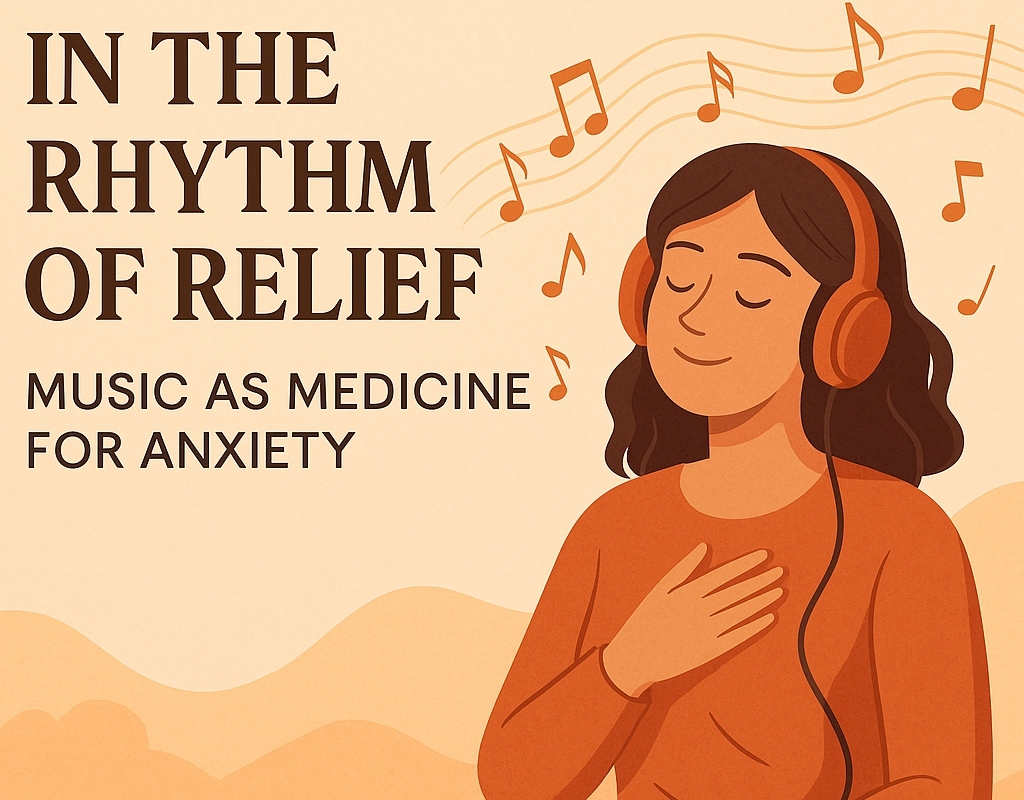IN THE RHYTHM OF RELIEF
MUSIC AS MEDICINE FOR ANXIETY

In today’s world, people are busier than ever juggling careers, family responsibilities, social expectations, and the endless stream of information coming from digital devices. Amid the hustle, many forget to slow down and tend to their mental health. Self-care becomes an afterthought, buried beneath deadlines and notifications. The result? An increasing number of people silently struggle with anxiety.
Anxiety can show up in many forms a racing mind, trouble sleeping, irritability, or a constant sense of being overwhelmed. With the pressures of modern life only growing, more people are seeking ways to manage stress and find inner peace. While therapy, mindfulness, and medication are common approaches, there’s another tool that is surprisingly effective and accessible to nearly everyone: music.
Music has long been recognized for its emotional power. From lullabies that soothe babies to anthems that stir collective pride, music reaches deep into the human psyche. But science is now catching up with what many have felt instinctively that music can actually help reduce anxiety.
When we listen to calming music, our brain releases dopamine, a chemical associated with pleasure and relaxation. It also lowers cortisol levels, which are linked to stress. Music with a slow tempo, gentle melodies, and minimal lyrics has been shown to activate the parasympathetic nervous system the body’s natural “rest and digest” mode—helping the heart rate slow down and muscles relax.
Studies have even shown that listening to certain kinds of music can be just as effective as some anti-anxiety medications for mild to moderate anxiety. In hospitals, music therapy is now used to help patients before surgery, during recovery, and even in mental health settings to ease tension and promote healing.
Beyond clinical use, music can be a daily source of relief. Whether it’s a peaceful piano track in the background while working, nature sounds during a morning walk, or a favorite playlist during a tough day, music creates a safe emotional space. It allows the mind to breathe and the heart to settle.
Everyone’s musical “medicine” is different. Some find peace in classical compositions, others in jazz, acoustic folk, or even instrumental film scores. The key is intentional listening choosing music that soothes rather than stimulates, and making time to truly engage with it.
In a world that rarely pauses, music invites us to slow down, reflect, and reconnect. It doesn’t require expensive equipment, a prescription, or hours of free time. All it takes is a few minutes, a pair of headphones, and the willingness to listen.
So the next time life feels overwhelming, consider pressing play instead of pushing through. The rhythm of relief might be just a song away.

Hands United for Lifelong Aid and
Human
Upliftment Lever Foundation
Since 2012
ALL CONTACTS
-
Registered Office:
1/5 Parel Shivshandesh CHSL., Kasturba Gandhi Nagar, LR Papan Marg, Worli, Mumbai 400018. -
Branches:
Worli, Charni Road, Kalyan, Pune - +91-8082376061 , +91-8369001611
- hulahulgrp@gmail.com
SUPPORT US
If you wish to contribute to our mission, you can make a donation via bank transfer to the following account:
Bank Details
Name: HULAHUL Foundation
Bank: IDBI Bank
Account Number: 0026104000273299
IFSC Code: IBKL0000026
Branch: Prabhadevi


Leave a Reply